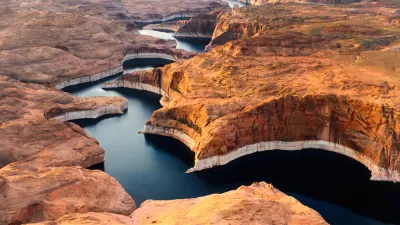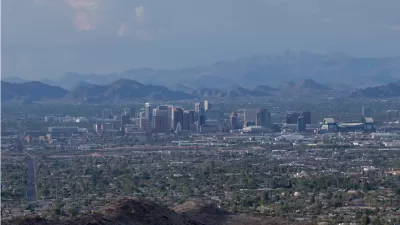Frustrated with Congress' inability to fund a six-year transportation bill, Mayor Greg Stanton is backing an August sales tax measure to expand light rail. Stanton also discusses climate change and water rights in the article and accompanying videos
With transit ridership on the rise and vehicle miles traveled having peaked in 2007, Democrat Mayor Greg Stanton, elected in 2011, is backing an August vote to increase the city sales tax to improve transportation in the nation's sixth largest city, though he calls it the fifth in the a wide-ranging, 25-minute interview with James Hohmann of The Washington Post that includes renewable energy, urban growth and coping with the drought. It includes Q&A with the audience.
Most importantly, he said that cities can't count on the financial help from Washington, D.C. that they city enjoyed in the past, which is the central topic of this "PowerPost."
"Historically, he said, a city like Phoenix could count on the federal government to pick up 75 to 80 percent of the cost," writes Hohmann. "He’s working on the assumption that they will only put forward about 30 percent – “if we’re lucky.”
After the City Council approved a 30-year "$30 billion wish list" on March 3, "residents will vote as soon as August on a 0.70 percent sales tax...that would be in place from 2016 through 2050 to fund transportation," wrote Brenna Goth of The Arizona Republic.
Phoenix's current transit sales tax of 0.4 percent, approved by 65 percent of Phoenix voters in 2000, will expire in 2020.
The proposed plan includes up to 117 miles of new high-capacity transit like light rail, bus rapid transit or streetcars. About $2.4 billion would help maintain major city streets while adding new bicycle lanes and street lights.
Climate change
"Phoenix is becoming increasingly urban, and Stanton wants to plan for the long term and to prepare for climate change," writes Hohmann. Climate change and water rights can by accessed directly in a short, second video on the interview.
Statewide, it’s definitely a hard sell,” he said, noting that Arizona is a Republican-leaning state. “Whether people conveniently or otherwise may not want to believe in climate change, it’s real … and we better get on top of it.”
Water wars?
"One thing we can't allow to occur is to have our friends in Southern California have access to water that rightfully belongs to the people of Arizona," he tells Hohmann.
Reelection?
Both the transportation sales tax and the mayoral election will be held on August 25. A prediction has already been made as to the outcome on one of those votes.
Hat tip: by Katie Pearce of Streetsblog USA.
FULL STORY: Phoenix Mayor: Cities adjusting to less federal money for transportation

Maui's Vacation Rental Debate Turns Ugly
Verbal attacks, misinformation campaigns and fistfights plague a high-stakes debate to convert thousands of vacation rentals into long-term housing.

Planetizen Federal Action Tracker
A weekly monitor of how Trump’s orders and actions are impacting planners and planning in America.

San Francisco Suspends Traffic Calming Amidst Record Deaths
Citing “a challenging fiscal landscape,” the city will cease the program on the heels of 42 traffic deaths, including 24 pedestrians.

Defunct Pittsburgh Power Plant to Become Residential Tower
A decommissioned steam heat plant will be redeveloped into almost 100 affordable housing units.

Trump Prompts Restructuring of Transportation Research Board in “Unprecedented Overreach”
The TRB has eliminated more than half of its committees including those focused on climate, equity, and cities.

Amtrak Rolls Out New Orleans to Alabama “Mardi Gras” Train
The new service will operate morning and evening departures between Mobile and New Orleans.
Urban Design for Planners 1: Software Tools
This six-course series explores essential urban design concepts using open source software and equips planners with the tools they need to participate fully in the urban design process.
Planning for Universal Design
Learn the tools for implementing Universal Design in planning regulations.
Heyer Gruel & Associates PA
JM Goldson LLC
Custer County Colorado
City of Camden Redevelopment Agency
City of Astoria
Transportation Research & Education Center (TREC) at Portland State University
Jefferson Parish Government
Camden Redevelopment Agency
City of Claremont




























